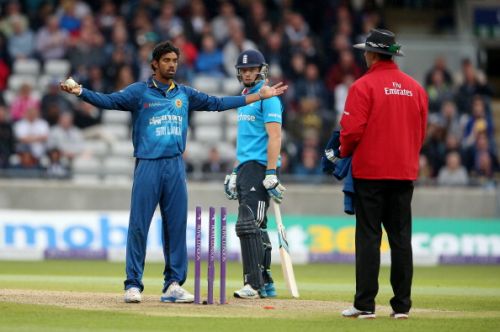 | « Back to article | Print this article |
'Mankading' raises debate on spirit of cricket once again
Nothing tends to divide fans more than a supposed affront to the 'spirit' of cricket, the standard of conduct that sits alongside its laws to help govern the so-called gentleman's game.
When Sri Lanka's Sachithra Senanayake removed the bails as batsman Jos Buttler was backing up at the non-striker's end during Tuesday's fifth and final one-day international at Edgbaston, howls of outrage could be heard before the England man was back in the pavilion.
He became one of the few players run out in such circumstances - known as 'Mankading' after Vinoo Mankad, who dismissed Australia's Bill Brown in a Test in Sydney in 1947 in similar circumstances.
Boos erupted as Buttler departed for 21, his dismissal overshadowing a mediocre England batting display as they stuttered to 219 all out with the series poised at 2-2, eventually falling to a six-wicket defeat.
The dismissal falls within law 42.15, which states: "The bowler is permitted, before releasing the ball and provided he has not completed his usual delivery swing, to attempt to run out the non-striker."
'Mathews could have called him back and set the tone'
That failed to stop Senanayake, subject of an investigation for a suspicious bowling action, and captain Angelo Mathews coming in for criticism from those claiming the pair's conduct was unbecoming of international cricketers.
"I blame the captain of Sri Lanka, Angelo Mathews, for the run out of Jos Buttler," former England captain Michael Vaughan wrote in the Daily Telegraph.
"He could have called him back and set the tone.
"An international captain should say to his bowler, 'let's just get on with the game'. But the incident reflects poorly on the Sri Lanka team and Sachithra Senanayake. I know he was out of his crease but Jos Buttler was not trying to steal a single. He was only a few inches out of his ground."
'Sri Lanka were well within their rights to send Buttler on his way'
Former England spinner Graeme Swann said on Twitter: "To be clear on this I think the Mankad is just wrong even though it's not illegal. Like cuddling your sister while watching a film."
Unsurprisingly Sri Lanka were steadfast in their belief that they were in the right, and were offered support by numerous figures within the sport.
"At the end of the day I think as long as the player's warned it's obviously in the rules so you can make whatever decision you want," Australian captain Michael Clarke said.
And Mike Atherton, the former England captain, wrote in the Times: "The cat-calls, boos and whistles that accompanied Jos Buttler's return to the England dressing room yesterday, having been 'Mankaded' by Sachithra Senanayake, illustrate just how far the woolly notion of the spirit of cricket has confused things.
"Sri Lanka were well within their rights to send Buttler on his way. You could even argue that they had been extra courteous by affording the batsman a warning."
Less than pure
Cricket has often been viewed by its admirers as a cut above other pastimes, but a host of incidents including match-fixing, sledging and the underarm bowling controversy involving Australia's Trevor Chappell in 1981 indicate it is not as pure as some would believe.
Things become murky in situations - such as the underarm delivery - that technically are not illegal, but are seen to strike at the heart of how many want the game to be played.
Sri Lanka themselves have been involved in similar controversy. During a Test in Christchurch in 2006 Muttiah Muralitharan was run out by New Zealand's Brendon McCullum, having left his ground to congratulate Kumar Sangakkara on making a century.
The ball had yet to be ruled dead, although that didn't stop then-captain Mahela Jayawardene expressing his disappointment, proving nothing is clear-cut when it comes to the intangible customs that govern the game.
"Legally it was run out. The ball was alive, but we play in an age where we talk about the spirit of the game," he said. "Hopefully it won't happen again. It's not the way to play cricket."



